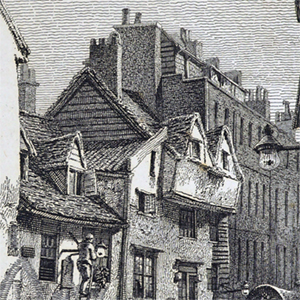Duke Street
Names
- Duke Street
- Ducke Lane
- Duck Lane
- Duke Lane
- Duklane
Street/Area/District
- Duke Street
Maps & Views
- 1560 London (Jansson, 1657): Duck Lane
- 1666 London after the fire (Bowen, 1772): Duck Lane
- 1677 A Large and Accurate Map of the City of London (Ogilby & Morgan): Duck Lane
- 1720 London (Strype): Duck Lane
- 1736 London (Moll & Bowles): Duck Lane
- 1746 London, Westminster & Southwark (Rocque): Duck Lane
- 1761 London (Dodsley): Duck Lane
Descriptions
from A Dictionary of London, by Henry Harben (1918)
Duke Street
North from Little Britain to West Smithfield and Long Lane, in Aldersgate Ward and Farringdon Ward Without (Horwood, 1799–O.S. 1880).
Former names: "Ducke Lane" (Stow, ed. 1633, p. 418). "Duck Lane" 1634–5 (L. and P. Chas. I. p. 590, and O. and M. 1677–Strype, 1755). "Duke Lane" (S. 379). "Duklane," 1411 (Cal. P.R. H. IV. 1408–13, p. 273); and 1544 (L. and P. H. VIII. XIX. (1), p. 376).
Called Little Britain (q.v.) since 1885.
from A New View of London, by Edward Hatton (1708)
Duck lane, betn Smithfield NW and Little britain SE, L. 140 Yds. Here live many Booksellers and Binders.
from A Survey of the Cities of London and Westminster, by John Strype (1720)
Duck lane cometh out of Little Brittain, and falls into Smithfield, a Place generally inhabited by Booksellers, that sell Second-hand Books. In this Lane is Blue Anchor Inn, which is but of an indifferent Trade; being the corner House, and part of it in Little Brittain, leading to the Hospital, which is in this Ward as far as Well Close.
from London and Its Environs Described, by Robert and James Dodsley (1761)
Duck lane, West Smithfield.
from London Past and Present: Its History, Associations, and Traditions, by Henry Benjamin Wheatley and Peter Cunningham (1891)
Duck Lane, afterwards Duke Street, and now Little Britain, West Smithfield.
"Duck Lane cometh out of Little Britain and falls into Smithfield, a place generally inhabited by Booksellers that sell second-hand books."—R.B., in Strype, B. iii. p. 284.
I will not let you run so much o' th' score,
Poor Duck Lane braine, trust me, I'll trust no more.
Randolph's Pedler; Poems, 1668, p. 325.
Touching your Poet Laureate Skelton, I found him at last skulking in Duck Lane, pitifully tattered and torn.—Howell's Letters, ed. 1737, p. 484.
March 18, 1668.—To Duck Lane, and there bought Montaigne's Essays in English.—Pepys.
April 10 (Friday), 1668.—To Duck Lane, and there kissed bookseller's wife, and bought Legend.—Pepys.
July 13, 1668.—Walked to Duck Lane, and there to the bookseller's at the Bible. I did there look upon and buy some books, and made way for coming again to the man.—Pepys.
Shirley, the scandal of the ancient stage,
Shirley, the very Durfey of his age;
Think how he lies in Duck Lane shops forlorn,
And never mention'd but with utmost scorn!
Gould's Playhouse, A Satire, 1709.
Here dregs and sediments of auctions reign,
Refuse of fairs and gleanings of Duck Lane.—Garth.
Scotists and Thomists now in peace remain
Amidst their kindred cobwebs in Duck Lane.
Pope, Essay on Criticism.
Some country-squire to Lintot goes,
Inquires for Swift in Verse and Prose:
Says Lintot, "I have heard the name,
He died a year ago."—"The same."
He searches all the shop in vain.
"Sir, you may find him in Duck Lane.
I sent them with a load of books,
Last Monday, to the Pastry Cook's."—Swift.
To the passage in the Essay on Criticism Pope appends a note: "A place where old and second-hand books were sold formerly, near Smithfield." But it was not formerly confined to the sale of old and second-hand books. New books were also published there. Thus Alexander Gill ("Infamous Gill," as Jonson styles him), in his "railing rhymes" "Upon Ben Jonson's Magnetic Lady," tells him that if it is to come to the press,
In cap paper let it printed be
Indeed brown paper is too good for thee
* * * * *
From Bucklers' Bury let it not be barde [barred]
But think not of Duck Lane or Paul's-Church Yard.1
Implying evidently that the publishers of Duck Lane were too good for the publication of such a work. "The Cyprian Academy, by Robert Brown of Gray's Inne, Gent. London, 1648," was "printed by W.W., and are to be sold by J. Hardesty, J. Huntington, and T. Jackson, at their shops in Duck Lane." "The Famous History of Friar Bacon: Very Pleasant and Delightful to the End," was printed (without a date) "for W. Thackery at the Angel in Duck Lane." One at least of Lord Brooke's productions was published, 1641, "at the Signe of the Hand and Bible in Duck Lane," and there were other booksellers at the Bell (1671, W. Whitewood) and the Black Raven (J. Conyers) on Duck Lane. A notice in A View of Sundry Examples, etc., imprinted at London for William Wright [4to, no date, but probably about 1580], carries back the character of the place farther than any of the above quotations, without adding to its credit. It states that in February 1, 1575, "Anne Oueries, a widdowe, who dwelled in Duck Lane, comming to the house of one Richard Williamson in Wood Streete, whose wife used to dress Flax and Towe, she took six pound of Towe, and departed without paying therefor."
1 Gill's satire is printed, with Ben Jonson's reply, by Gifford in his Notes at the end of the "Magnetic Lady," Gifford's Jonson, vol. vi. p. 125; and Col. Cunningham's ed., vol. ii. pp. 437, 438.
